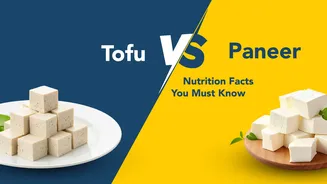Lentils: The Mighty Pulse
Lentils are a nutritional powerhouse, celebrated for their high protein content and ease of use. They're a staple in many cuisines and are easily incorporated
into soups, stews, and salads. Lentils provide a substantial amount of protein per serving, making them a perfect addition for vegetarians looking to boost their intake. Moreover, lentils are also a good source of fiber, which is beneficial for digestive health. Whether you choose red, green, or brown lentils, you're getting a versatile and protein-packed food. Incorporating lentils into your diet is simple; they cook relatively quickly and absorb flavors, offering a range of delicious meal options. Consider using them to add bulk and protein to your next meal, such as a lentil soup or a hearty lentil salad.
Chickpeas: Versatile Protein Source
Chickpeas, also known as garbanzo beans, are a fundamental ingredient in various culinary traditions. They offer a significant amount of protein, alongside other nutrients like fiber and iron. Chickpeas can be prepared in various ways, including roasting, boiling, or even blending into hummus. They serve as a flexible ingredient in salads, stews, or as a standalone snack. These legumes are not only rich in protein, but also contribute to a feeling of fullness due to their high fiber content. Their adaptable nature allows for diverse flavor profiles, making them an ideal choice for anyone aiming to increase protein intake in their vegetarian meals. Whether you're making a quick snack or a full meal, chickpeas are a great choice.
Tofu: The Soybean Champion
Tofu, derived from soybeans, is a versatile protein source widely embraced in vegetarian and vegan diets. It's known for its ability to absorb flavors, allowing it to be used in numerous dishes. The protein content of tofu is significant, making it a valuable choice for those seeking to fulfill their protein requirements. Tofu can be prepared in various ways, like frying, baking, or scrambling, making it appropriate for both savory and sweet recipes. Its flexibility makes it a good match for a diverse range of culinary applications, from stir-fries to desserts. For those new to tofu, experimenting with different cooking methods can unlock its potential as a delicious and nutritious protein source, contributing significantly to a well-balanced vegetarian diet.
Edamame: Young Soybean Delight
Edamame, which are young soybeans, are frequently steamed or boiled and seasoned to create a satisfying snack or side dish. Edamame offers a substantial amount of protein, as well as a good supply of fiber and essential nutrients. These soybeans are a straightforward addition to a vegetarian diet and can be enjoyed on their own or added to salads and other dishes. The convenient availability of edamame makes it an easy and tasty way to incorporate plant-based protein into your meals. Considering its mild taste and versatile nature, edamame stands as a pleasant and nutritious option for anyone looking to boost protein in their daily intake. It is also a great source of antioxidants, making it beneficial for overall health.
Quinoa: The Complete Protein
Quinoa is a remarkable grain, acknowledged for its complete protein status, containing all nine essential amino acids. It is a versatile ingredient that is suitable for various dishes. Besides protein, quinoa delivers essential vitamins and minerals. It's also gluten-free, which makes it a valuable option for those with gluten sensitivities. Quinoa can be cooked and enjoyed in salads, side dishes, or as a grain base for various meals. Its easy preparation and nutty flavor make it a simple addition to any diet. Including quinoa in your meals assures a nutritional punch, making it a great option for vegetarians seeking a complete protein source. From breakfast bowls to dinner sides, quinoa provides a flexible and wholesome addition.
Chia Seeds: Tiny Protein Power
Chia seeds, though small, are rich in protein, making them a beneficial addition to a vegetarian diet. Besides their protein content, they also provide fiber, omega-3 fatty acids, and antioxidants. Chia seeds can be easily incorporated into your diet by adding them to smoothies, yogurt, or oatmeal. They can also be used as a binding agent in baking, replacing eggs. Their neutral flavor allows them to blend seamlessly into many recipes. Their versatility also makes them a convenient option for snacks or meals, contributing to overall health. Given their nutritional profile and simplicity of use, chia seeds are a convenient way to include protein into your daily food plan, especially in a vegetarian diet.
Nuts and Seeds: Protein Bites
Nuts and seeds serve as a great source of protein and a satisfying snack. Almonds, walnuts, pumpkin seeds, and sunflower seeds are just a few choices. Nuts and seeds provide not just protein, but also healthy fats and fiber. These can be eaten on their own or added to salads, yogurts, and other dishes to boost nutritional content. They offer a practical and flexible way to improve protein intake. Nuts and seeds are readily available and easy to incorporate into daily meals, providing a quick protein boost and contributing to satiety. Consider keeping a mix of nuts and seeds at hand for a snack, making them a beneficial and tasty way to get your protein.
Spinach: Green Protein Source
Spinach, often celebrated for its iron content, is also a valuable vegetarian protein source. Incorporating spinach into your diet is easy, as it can be added to salads, smoothies, or cooked as a side dish. Spinach not only provides protein, but it's also loaded with essential vitamins and minerals. Adding spinach to your meals is a simple method to increase your protein consumption and add a nutritional punch. The adaptability of spinach makes it a great ingredient, enabling diverse preparation methods and taste profiles. Using spinach is a practical way to enhance your protein intake while enjoying its many health benefits. Thus, it's a great choice for anyone looking to incorporate more protein in a vegetarian diet.












